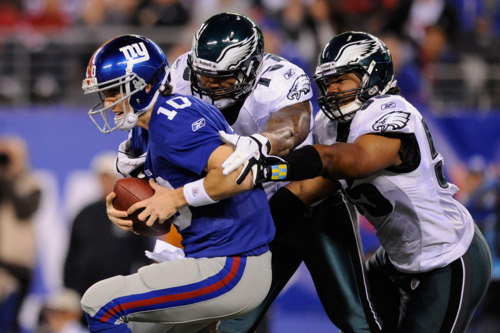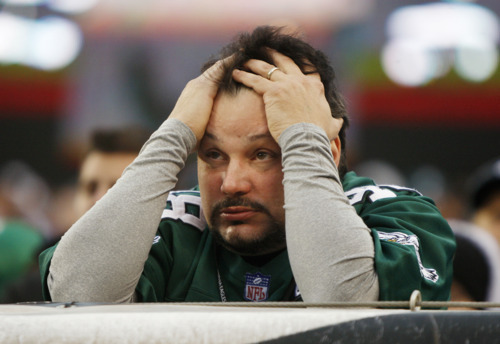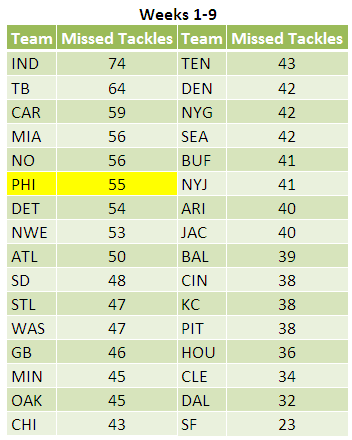This season is over. Most reasonable Eagles fans understand this. The only thing left is to discuss whether or not Andy Reid must go. Thus, I searched the interwebs and Twitter for a smart, rational opponent to debate. Justin F. (follow him here) has been that and more. Read our back-and-forth exchange below.
Brian #1:
Let me start by saying that I’m not one of these people who has been calling in to WIP for years, yelling about how Andy Reid can’t win it all. He’s been remarkably successful over the last 13 years, and I both recognize and appreciate that. But after this crap-tastic season, I don’t see how Reid can keep his job any longer.
There are a few reasons, but let’s put the obvious one out there first. After failing with his first post-JJ defensive coordinator pick, Andy had plenty of time to find a suitable replacement. Yet instead of going for one of the many qualified candidates out there, he promoted his offensive line coach. The choice made no sense at the time and I don’t think I’m exaggerating when in retrospect it looks like one of the worst coordinator hires in modern NFL history. It’s one thing to make make a bad hire based on reasonable expectations (McDermott). But no team should retain management that makes such an incomprehensible, season-destroying move.
Justin #1:
Juan Castillo was a confusing decision to say the least. Now, we do not have the benefit of knowing exactly what the Eagles knew during the time of the interviews or what they saw in his 12 years as offensive line coach. They said he was always working with the defense, though I guess you can only take that at face value. Without a doubt, the Juan Castillo hiring was a mistake. All you need to do is watch the Cardinals’ game-winning drive to see confirmation of that one. With Nnamdi Asomugha and Asante Samuel both on the field, Juan Castillo decided it would be a good idea to put Jaiquawn Jarrett one-on-one on Larry Fitzgerald.
That being said, it is a very rare occasion that one fires a coordinator (offensive or defense) in the middle of the season, no matter how bad a job he is doing. If Castillo remains as defensive coordinator next season, then Reid will have more than a few questions to answer. Castillo was a mistake, but I am not of the belief that a coach should be fired for a single mistake, no matter how bad it is, especially a coach as successful as Andy Reid has been in his tenure at Philadelphia. It is a mistake that can be fixed in the off-season and the Eagles can go from there. Again though, I am going off the assumption that Reid will have the good taste not to bring Castillo back as Defensive Coordinator in 2012.
Brian #2:
Not all mistakes are equal. Choosing Castillo as your coordinator for an “all-in” season is a worse than pretty much any other football-related personnel decision I can think of.
But even putting Juan aside, there are other reasons to end Reid’s tenure after this disastrous season. To allow a hodgepodge of young, untested, low-round picks man the linebacker corps was almost as unthinkable as promoting Castillo. Reid shares the blame with Howie Roseman, but he has enough clout to demand better. And it’s Reid’s ultimate responsibility to put his players “in the best position to win.” That’s often just a cliché he uses to admirably deflect blame from others, but these days it’s true. When your top two wide receivers are out, your quarterback is struggling, your running back is all-pro, and you have the lead, the answer is obviously not, “Let’s keep throwing.” At some point you have to hold Andy responsible for coaching decisions that have crippled the team’s ability to win.
Justin #2:
The way the Eagles structured their contracts, I do not see them as going all in this year. They will still have cap flexibility heading into the off-season and if things continue going in the way they are going, a lot of good draft picks to build upon.
While Andy Reid has not drafted a linebacker with a top pick, sometimes the late round picks turn out to be great bargains. Jeremiah Trotter was a 3rd round pick, for instance. The Casey Matthews draft pick has been somewhat controversial among Eagles fans, most of whom have completely given up on him now. The mistake made there was he should have started on special teams at first instead of the Week 1 middle linebacker, not in picking him in the 4th round. Reid certainly called better games in his career than the game he called last Sunday in Arizona, however, he has not ignored the run completely this season. LeSean McCoy had 30 carries for 185 yards in the game against Dallas. But as several studies have shown, overall teams do not win because they run the ball a lot, they run the ball a lot because they are winning. A 2007 study by Advanced NFL Stats concluded that passing the ball is much more important to winning than running the ball. To get back to Reid, though, I am under no pretense that he is perfect and has not made mistakes, even very stupid ones (cough cough Castillo), but under his guidance, the Eagles have been atop the NFC as consistently as one can possibly be in the past decade. Those that expect a coach to not occasionally head-scratching mistake will be bitterly disappointed as long as humans coach football. There will be down years (2005, 2007), and barring a miraculous turn around this will be one of them, but I still see Reid as a net positive for the Eagles.
Brian #3:
I’m not stuck in a backward view of the NFL. This is a passing league. But that doesn’t mean there aren’t times when it’s important to run the ball. It seemed like Reid had finally acquiesced to that view in those previous games, but the ratio on Sunday was unforgivable given the circumstances.
This consistency argument is ultimately what it comes down to. I held that view for years, and assumed that just keeping competitive would result in a random Super Bowl win. But I don’t believe that anymore. Long term, I just can’t look at this team and see any improvement over the last six seasons. Reid was at his best building the Eagles up from ‘99 to 2004, and it culminated in one Super Bowl appearance. 2005 was a lost year, but since then Reid hasn’t made any progress. The Eagles frequently reach the playoffs. The problem isn’t that Reid “can’t win the big one,” but rather that none of these teams been serious Super Bowl contenders.
Considering this lack of progress, and the multiple huge management blunders that derailed this season, it’s time to hit the reset button.
Justin #3:
If Andy had known Vick had gotten hurt early in the game (which allegedly he did not know), I think you would have seen a lot more of LeSean McCoy than we actually did.
Just keeping competitive will result in a random Super Bowl win. Eventually. Since 2005, the only year the Eagles missed the playoffs was 2007. You do not need to be a great team to win a Super Bowl, and conversely not all great teams do win the Super Bowl. Super Bowl XLII is a perfect example of this. Patriots had one of the most dominant seasons any team has ever had, and the Giants were 10-6 with nobody claiming they deserved a better fate. The Giants got the 5-seed, won on the road 3 times in the NFC Playoffs and won the Super Bowl. Not because they suddenly became a better team than the best NFL team of the past decade, but there is a degree of random chance in the NFL Playoffs. Again I go back to the Super Bowl XLII winning Giants. For goodness sake, David Tyree. Tyree was practically a nobody before that game, and now he is retired. Any team that qualifies for the playoffs is a serious Super Bowl contender. The year following the Giants Super Bowl win, everyone guffawed at the Arizona Cardinals in the playoffs. The question surrounding their opening playoff game against Atlanta was how much would the Falcons beat them by.
While this is a down year for the Eagles, part of it due to poor chance (Falcons game being a prime example) and partly due to poor play (Cardinals game) and a huge defensive coordinator blunder (hiring Castillo), Andy Reid has exhibited the consistency needed from an NFL team to win the Super Bowl. Even though expectations were high this year (ohai, Vince Young) and they have fallen short of them, the appropriate response is not to blow up the coaching staff and fire Andy. Rather, the Eagles would be well served to get a new coordinator next year, be as wise as possible with their likely high 1st round pick and 2 high 2nd round picks, make smart free agent signings, and come out firing with Andy Reid at the helm for the 2012 NFL season.
What do you think?




